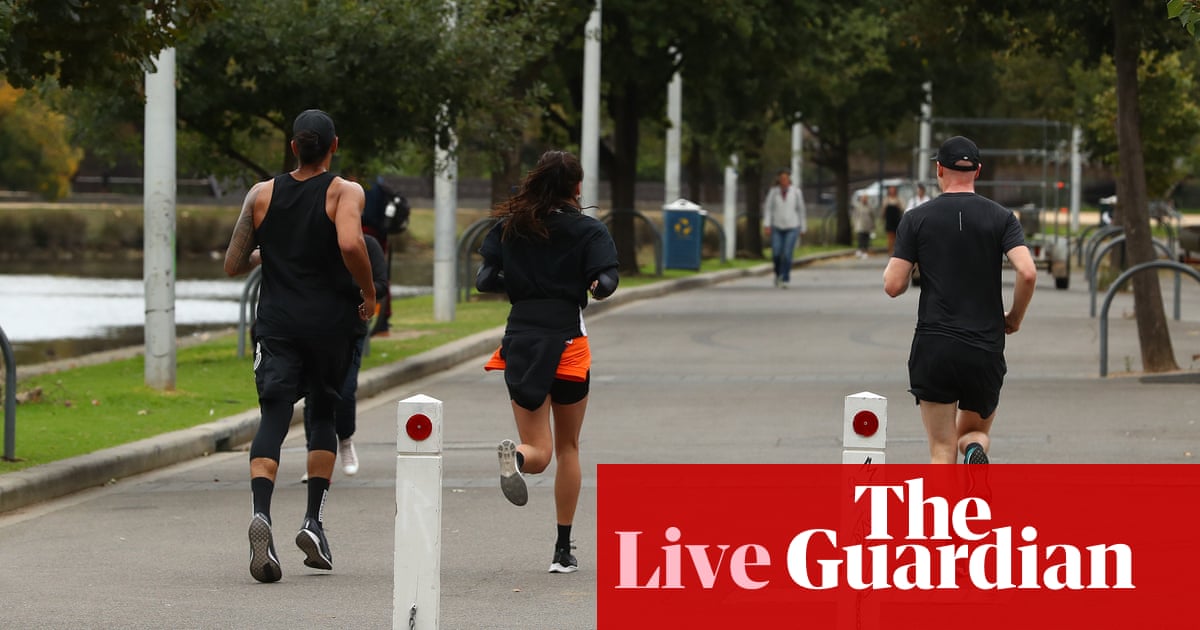The Greens have also called for a freeze on tenant evictions.
From Adam Bandt:
The Greens have also written to the National Cabinet urging a moratorium on evictions and foreclosures as well as rent and mortgage holidays, after the NSW and Tasmanian Parliaments over the last 2 days passed Greens amendments to protect renters.
“Scott Morrison’s trickle-down stimulus is failing to keep people in work because he refused to make jobs and wages guarantees part of his multi-billion dollar support package.
So to recap those announcements from Mark McGowan:
WA schools are moving to pupil free on April 3
Term two will most likely be online (with students whose parents are essential workers, supervised at school)
The international passengers on the Artania cruise ship, who fall ill and need treatment, will be taken to a commonwealth facility – like a defence force base – and flown home by direct flight, if their government can arrange it. Other passengers must remain on board, until the ship can return to South Africa.
The Australian passengers on the Vasco de Gama will be quarantined on Rottnest Island. Each state is being asked to take back their residents. There are 800 Australians on board, with 200 West Australians. The ship is due to dock in Fremantle on Monday.
No one from a cruise ship will be allowed off, without an escort to an isolation facility. No one gets to go home until that isolation is complete.
Mark McGowan moves on to the Vasco de Gama which has 800 Australians on board, including 200 West Australians, which is also due to dock in Fremantle on Monday (there are also 109 New Zealanders, 33 British people and other international passengers)
Yesterday, he said all the Australian passengers would have to self-isolate on Rottnest Island.
Today, he wants the other Australian states to take back their residents
We are in urgent talks with the other Australian States to see if they would agree to accept their citizens from the Vasco da Gama via a direct flight.
Currently we don’t know how many passengers are from each state, other than the 200 from WA.
In summary, regarding the Vasco da Gama, the international passengers will be held on board until direct transport arrangements are finalised to fly them home, escorted to the airport. The crew will remain on board. All West Australians will self-isolate for 14 days at Rottnest Island.
Interstate passengers will have an option. If agreed by their home State to fly home directly or remain on the ship, self-isolating, until travel arrangements are made.
Rottnest Island will be used as a last resort for them. I am phoning each State Premier about this. We would prefer they go home and self-isolate in their home State rather than stay here.
The reality is I want to make sure Rottnest Island has capacity into the future if we need to use it for other West Australians or other emergencies. I know this all sounds pretty extreme but it’s the right thing to do because our first priority is the health and wellbeing of West Australians.
Mark McGowan on the Artania cruise ship (docked at Fremantle, with no Australians on board) which has seven passengers with Covid-19:
WA’s position is this: If the seven passengers need to come onshore for medical treatment, they will have to go to a commonwealth facility, such as a defence force base. If this occurred, then Germany and the Australian government can organise a plane to come and pick those passengers up and take them home. We are working with the Australian government to do this immediately. The Artania cruise ship must continue on its journey to South Africa urgently. This ship needs to leave immediately. I want the commonwealth to make that happen.
Updated
WA premier Mark McGowan says WA will also go pupil free from 3 April.
Like Qld, NSW, SA and the ACT, schools will be open (outside of the school holidays) for parents who have no choice.
Online learning is on its way.
Updated
Virgin Australia announced yesterday it would be grounding all Tiger Air flights.
This is the next step:
Julian Abbott
(@JulianBAbbott)BREAKING: ALL 220 pilots at Tiger Airways will be made redundant. That’s from the Australian Federation of Air Pilots.
Jobs gone by the end of April.
March 26, 2020
Updated
The Maritime Union of Australia wants the government to turn the Aurora Australis (the former Antarctic expedition ship) into a new distribution vessel for Norfolk Island:
The Aurora, affectionately known as the “Orange Roughy”, this week returned from its final voyage for the Australian Antarctic Division where it delivered 12 months worth of cargo, food and fuel to remote Macquarie Island.
Norfolk Island is dealing with a growing crisis following the loss of one of two vessels that previously supplied the island, along with a massive reduction in air travel, resulting in chronic shortages of food, stock feed, building materials, and other essential supplies needed by the island’s 1,800 residents.
With no port, and without the ability to handle containerised freight, the island has been left dependent on a single small vessel sailing once every two months from Auckland. For the limited goods that are supplied, freight costs have led to the doubling of prices compared to mainland Australia.
The Maritime Union of Australia argues the Aurora Australis is uniquely suited to addressing the crisis facing Norfolk Island. Not only does it have the capacity to carry 1,790 cubic metres non-containerised break bulk cargo, along with an additional deck capacity for 700 tonnes of containerised freight, but it has three decades of experience delivering supplies to remote locations.
The vessel can also carry and transfer nearly two million litres of fuel, meaning it would be able to provide all the fuel needed by vehicles, heavy machinery, and the airport on Norfolk Island.
Updated
The Family Court has released information on parenting orders – it has been inundated with calls.
Family Court of Aust
(@FamilyCourtAU)The Chief Justice of the Family Court of Australia, the Hon Will Alstergren has released a statement regardng parenting orders and the COVID-19 pandemic. See: https://t.co/ofRAzuQBoP pic.twitter.com/UfzPoFFxUu
March 26, 2020
All the state leaders are having a very hard time with this – particularly the smaller states, where tourism is the main economy driver.
Emily Baker
(@emlybkr)Premier Peter Gutwein is in tears talking about the forced sacking of tens of thousands of Tasmanians “at the stroke of my pen”. He says it broke his heart #politas #COVID19Tas
March 26, 2020

Calla Wahlquist
Veterinarians are classified as essential services and will be able to cross state borders and continue working under shutdowns currently in operation in Australia, the agriculture minister David Littleproud has said.
The Australian Veterinary Association (AVA) and the RSPCA have lobbied the government to ensure that veterinary and animal welfare services are declared “essential” and exempt from pandemic-related shutdowns, as they have been in New Zealand.
In a submission sent to government on Sunday, the AVA said that shutting down veterinary services would impact not only animal health, welfare, and biosecurity, “but also to human health and mental wellbeing, food safety, and food supply chain integrity and continuity”.
It said the AVA was willing and able to put in all necessary health and biosecurity controls.
In a statement to Guardian Australia, Littleproud said:
Veterinarians provide essential services to the agricultural sector and the general public.
The federal government has not placed any restrictions on their ability to operate.
The only confusion that has been created has been from some states closing borders but they have assured us that vets will still have the ability to operate across borders.
The RSPCA wrote to health minister Greg Hunt and other public health officials on Thursday, seeking “urgent confirmation” that its animal welfare inspectorate and other animal welfare services would be classified as essential services and allowed to continue operating.
Chief executive Richard Mussell said that people and organisations responsible for delivering “essential frontline animal care and protection services” needed clarification that they would be allowed to continue to operate.
In addition, we’re seeking confirmation that other primary animal carers will be able to access the premises where animals are kept and continue to provide them with food, water, attention and medical care.
These include, for example, zoos and aquariums, stables for racing and recreational horses, animal management services and local pounds, research facilities, and other breeding, housing and boarding facilities.
Updated
The agriculture industry is pushing for exemptions to ensure it can keep operating:
Kath Sullivan
(@KathSully)David Littleproud has told @afeltontaylor @abcrural that seasonal workers/backpackers working in horticulture that have a letter from their employer should be able to cross state borders for work. There’s more than 7000 seasonal workers and 140,000 backpackers now in Aust.
March 26, 2020
Here’s one reason the Queensland health authorities have judged it OK for the local government elections and by-elections to go ahead – people keep rushing out in large numbers to the liquor stores anyway:
Sarah Elks
(@sarahelks)Strong words from QLD Health Officer Jeannette Young on local govt elections: “There is no risk going to vote on Saturday…I’m more concerns with people going to Dan Murphy’s, the scenes I’ve seen there are appalling.” #qldpol #auspol #coronavirusau
March 26, 2020
Updated
Chris Bowen also wants to see the government expedite the respiratory clinics it promised:
The clear facts published on the department of health website confirms there are only two fever clinics up and running:
‘We are setting these clinics up over the next few weeks. Clinics in Ryde, NSW, and Morayfield, Qld, started operating on 21 March 2020.
If you’re not currently near Ryde, NSW, or Morayfield, Qld, there is no GP Respiratory Clinic in your area yet.’
The minister for health must take every action available to him to speed up the operation of the 100 respiratory clinics as soon as possible.
This would include any resources available through the national coordination mechanism or the Australian defence force.
Updated
The Australian Services Union, Australian Industry Group and the Australian Chamber of Commerce have come to an agreement to improve workplace flexibility during the coronavirus crisis for clerks.
It just needs a tick off from the Fair Work Commission now.
The application seeks to provide relief to business and employees during the pandemic by:
- Allowing employees and employers to agree to change ordinary hours of work whilst an employee is working at home. This should give employees expended options to help manage their job around things like schooling children from home during the day without an employer facing additional costs for work being conducted out of usual business hours.
- Allowing a business with one weeks’ notice to direct an employee to take annual leave if it decides to close down its operations.
- Allowing staff to work more flexibly across classifications, provided it is safe to do so and the employee has the necessary qualifications.
- Allowing for employers to direct employees to take annual leave.
- Increased flexibility in taking leave such as double leave at half-pay, where employers and employees agree.
- Allowing employers to engage casual and part-time employees for shorter shifts.
- Giving employers flexibility to reduce hours for full and part-time staff, whilst allowing employees whose hours are reduced to take on another job or ask to engage in training or additional study.
Updated
Labor calls for ban on evicting tenants
Labor’s Jason Clare, Chris Bowen and Anthony Albanese are out and about today (at the necessary social distance) to call for renters to be looked after.
We are still waiting on the decision from the national cabinet about what to do for renters. It is complicated – some landlords have lost their jobs, there are insurance implications and some people are just panicking, but a decision will need to be made soon, given that 280,000 people registered an intent to claim Centrelink benefits in one day.
Jason Clare:
Our home is our castle. In the next few months, it’s going to be our fortress. More and more Australians are being told to stay at home, but you can’t day at home if you don’t have one.
You can’t stay at home if you have been evicted. That’s why we’re saying we need a freeze on evictions, just like we’ve seen in the UK or in New Zealand, or for that matter in Tasmania.
Tasmania announced just yesterday that they are taking steps to stop evictions for the next few months.
That’s the sort of practical, common-sense measure, to make sure that we protect people.
This is a health measure, as much as an economic measure. When people are being told to stay at home, we need to make sure we’re not kicking people out on to the street.
And as Albo said, we’ve also got to protect landlords. We have to protect the home owners.
We have do protect the people who rely on that money – that rent – to pay the bills, put food on the table or to pay their mortgage.
That is why it is important that the big four banks have done what they have already promised to do – and that is defer mortgages to give people relief there.
We have to make sure that all banks, all building societies, all financial institutions that provide that finance to home owners provide the same sort of relief. Because we’re all in this together. We have to make sure that we look after each other. The bottom line is that no-one should lose their home, whether they own it or rent it, because of this virus.
Updated
South Australia to go pupil free from 4 April
On the footsteps of the Queensland announcement, South Australia is following suit, going “pupil free” from 4 April.
That means the schools will be open for people who need to send their kids there (outside of the school holidays for Easter) but parents, if they can, should keep their kids at home.
Teachers there are working on online and distance learning things as well.
Updated
The Queensland schools announcement from the education minister, Grace Grace:
In a nutshell, student-free days from Monday. Schools are open for essential workers and workers required in the workplace. Teachers will move to developing remote learning and online learning for students, and all those learning materials for what potentially may lie ahead, we will cater for any high risk workers that have concerns, and obviously vulnerable children will be catered for as well.
The ABS has released a survey of businesses before the first round of social distancing – which shows that businesses were already falling off the cliff. It basically shows that people were freaking out, before the forced business closures.
Approximately half of the Australian businesses surveyed (49%) had experienced an adverse impact as a result of Covid-19 during the mid-March data collection period and 86% of businesses expected to be impacted in future months. The collection period pre-dated the Australian government’s announcement of Phase 1 Social Distancing measures.
Adverse impacts were most prevalent in accommodation & food services with over three quarters of businesses (78%) already reporting impacts and 96% of businesses reporting that they expected impacts in coming months. Businesses in professional, scientific & technical services (21%), electricity, gas and water supply (34%) and businesses in mining (37%) were the least likely to have been adversely impacted by Covid-19 in the collection period.
A reduction in local demand was the most common impact experienced (82%) and was also the most common impact expected in coming months (81%). Of impacted businesses, over a third had experienced staff shortages (36%) and 59% expected to experience staff shortages in coming months.
Updated








